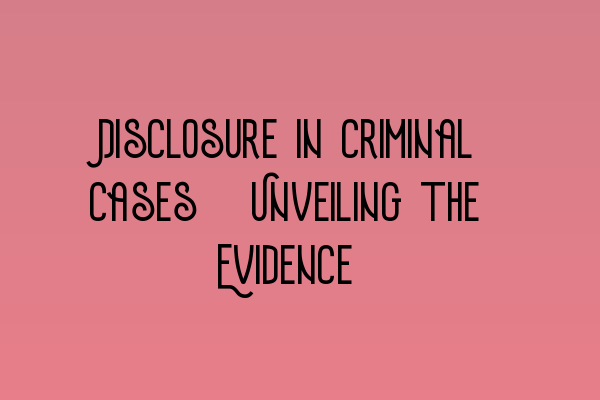Disclosure in Criminal Cases: Unveiling the Evidence
When it comes to criminal cases, the proper disclosure of evidence is vital in ensuring a fair and just trial. Disclosure refers to the process of sharing evidence between the prosecution and the defense, allowing both parties to prepare their cases and present their arguments effectively. In this blog post, we will dive into the importance of disclosure, the legal requirements surrounding it, and the challenges that may arise in the process.
The Significance of Disclosure
Disclosure plays a pivotal role in upholding the principles of justice and fairness in criminal cases. It allows both the prosecution and the defense to have access to all relevant evidence, ensuring that no party is taken by surprise during the trial. Without proper disclosure, the accused may be unfairly disadvantaged, leading to wrongful convictions or the undermining of public trust in the criminal justice system.
At SQE Criminal Law & Practice Law UK, we understand the critical role that disclosure plays in criminal cases, both at the pre-trial stage and throughout the trial. Our expert solicitors ensure that no stone is left unturned when it comes to uncovering and presenting crucial evidence.
Legal Requirements for Disclosure
The legal requirements for disclosure in criminal cases are outlined in the Criminal Procedure and Investigations Act 1996. This legislation places a duty on the prosecution to disclose all material evidence to the defense. Material evidence refers to any evidence that may undermine the prosecution’s case or support the defense’s case.
It is important to note that the duty of disclosure is an ongoing obligation. If any new evidence emerges during the course of the trial, it must be disclosed to the defense without delay. Failure to meet these legal requirements can have severe consequences, including the possibility of a mistrial or a successful appeal.
At SQE Criminal Law & Practice Law UK, our solicitors understand the nuances of the disclosure process and work diligently to ensure that all legal requirements are met. We leave no room for procedural errors or oversight, providing our clients with the strongest possible defense.
Challenges in Disclosure
Despite the legal requirements surrounding disclosure, there can be challenges in the process. One common challenge is the sheer volume of evidence that needs to be disclosed. In complex criminal cases, there may be numerous documents, witness statements, CCTV footage, and other forms of evidence that need to be reviewed and shared.
In some cases, the prosecution may also be hesitant to disclose certain evidence, particularly if it is believed to be sensitive or capable of compromising other ongoing investigations. Striking the balance between disclosure and safeguarding sensitive information can be a delicate task.
However, it is essential to remember that the principles of justice and fairness should prevail. At SQE Criminal Law & Practice Law UK, we are well-versed in navigating the challenges of disclosure. Our solicitors possess the expertise and experience necessary to ensure that all relevant evidence is uncovered and disclosed in accordance with the law.
For additional guidance on navigating the SQE exams, we recommend checking out our related articles:
- SQE 1 Practice Exam Questions
- SQE 1 Practice Mocks FLK1 FLK2
- SQE 2 Preparation Courses
- SQE1 Preparation Courses
- SRA SQE Exam Dates
As leaders in the field, we offer comprehensive preparation courses for the SQE exams, equipping aspiring solicitors with the knowledge and skills required to excel in their legal careers.
In Conclusion
Disclosure is a crucial aspect of criminal cases, ensuring that all parties have access to relevant evidence and can present their cases effectively. At SQE Criminal Law & Practice Law UK, we prioritize the principles of justice and fairness, leaving no room for procedural errors or oversights in the disclosure process. Contact us today to learn more about how our expert solicitors can assist you in navigating the complexities of disclosure and securing the best possible outcome in your criminal case.
